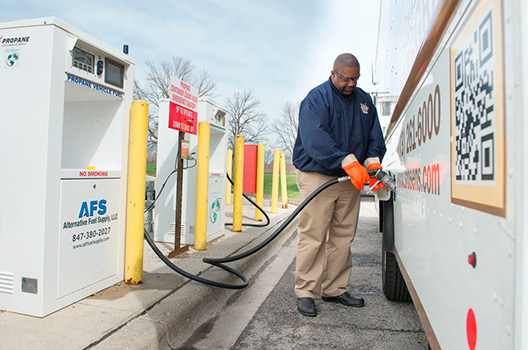Thursday, June 9, 2016
Alpha Baking Company in Chicago replaced 22 of its 300 diesel trucks with propane vehicles. These trucks are Class 4 Ford E-450 step vans with a 6.8-liter V-10 spark ignition engine with a Roush dedicated liquid propane injection system. These vehicles replaced model year 2002-2007 diesel Freightliner MT35/MT45 step vans equipped with Cummins 5.9-liter ISB diesel engines. 
Alpha Baking Company, Inc. was established in 1979 with the acquisition of the Mary Ann Baking Company in Chicago. Founded in 1935, Mary Ann is best known for the ever-popular Chicago style poppy seed hot dog bun. In 1981, Alpha Baking purchased S. Rosen’s Baking Company, a Chicago staple and baker of Jewish hearth rye breads and variety rolls since 1909. Through the years, Alpha Baking has continued to grow with several acquisitions.
With more than 1600 employees, Alpha's delivery routes number more than 300, and the company has 14 production lines and operates four production plants.
Analysis from Argonne’s Alternative Fuel Life-Cycle Environmental and Economic Transportation (AFLEET) Tool showed that the propane trucks provided notable petroleum displacement and greenhouse gas emission reductions with a slightly lower fuel economy than diesel vans.
“Total petroleum displacement was about 38,000 diesel gallon equivalent per year and the greenhouse gas emission reduction was roughly 80 tonnes annually,” according to Andy Burnham, an environmental scientist at Argonne. “The findings were very encouraging. Propane trucks work well for the baking industry, and their use led to significant petroleum displacement.”
The incremental costs of the propane step vans and the infrastructure needed to support them can be recouped in four to seven years, the study found. In addition, lower fuel prices and a reduction in maintenance costs for propane vans will continue the cost savings long after the capital costs for the vans and fueling stations are recouped.
Fuel economy was 10 miles per gallon for the diesel engines and 8.6 miles per diesel gallon equivalent for the propane vans. The seven cent per mile cost savings resulted from several factors, including the miles travelled for the propane and diesel vehicles, the vehicles’ fuel economy and the relative fuel costs of propane and diesel. For the propane vehicles, the average miles travelled per vehicle was slightly higher, the average fuel economy was lower, and fuel prices were lower. The net result of these three factors is the seven cent per mile fuel cost reduction.
(SOURCE: www.auto-gas.net)

Alpha Baking Company, Inc. was established in 1979 with the acquisition of the Mary Ann Baking Company in Chicago. Founded in 1935, Mary Ann is best known for the ever-popular Chicago style poppy seed hot dog bun. In 1981, Alpha Baking purchased S. Rosen’s Baking Company, a Chicago staple and baker of Jewish hearth rye breads and variety rolls since 1909. Through the years, Alpha Baking has continued to grow with several acquisitions.
With more than 1600 employees, Alpha's delivery routes number more than 300, and the company has 14 production lines and operates four production plants.
Analysis from Argonne’s Alternative Fuel Life-Cycle Environmental and Economic Transportation (AFLEET) Tool showed that the propane trucks provided notable petroleum displacement and greenhouse gas emission reductions with a slightly lower fuel economy than diesel vans.
“Total petroleum displacement was about 38,000 diesel gallon equivalent per year and the greenhouse gas emission reduction was roughly 80 tonnes annually,” according to Andy Burnham, an environmental scientist at Argonne. “The findings were very encouraging. Propane trucks work well for the baking industry, and their use led to significant petroleum displacement.”
The incremental costs of the propane step vans and the infrastructure needed to support them can be recouped in four to seven years, the study found. In addition, lower fuel prices and a reduction in maintenance costs for propane vans will continue the cost savings long after the capital costs for the vans and fueling stations are recouped.
Fuel economy was 10 miles per gallon for the diesel engines and 8.6 miles per diesel gallon equivalent for the propane vans. The seven cent per mile cost savings resulted from several factors, including the miles travelled for the propane and diesel vehicles, the vehicles’ fuel economy and the relative fuel costs of propane and diesel. For the propane vehicles, the average miles travelled per vehicle was slightly higher, the average fuel economy was lower, and fuel prices were lower. The net result of these three factors is the seven cent per mile fuel cost reduction.
(SOURCE: www.auto-gas.net)

